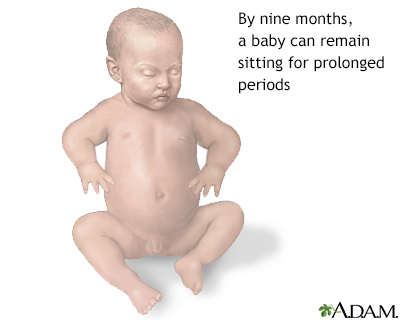Pregnancy SmartSiteTM
Growth milestones for children; Normal childhood growth milestones; Childhood growth milestones InformationDevelopmental milestones are behaviors or physical skills seen in infants and children as they grow and develop. Rolling over, crawling, walking, and talking are all considered milestones. The milestones are different for each age range. There is a normal range in which a child may reach each milestone. For example, walking may begin as early as 8 months in some children. Others walk as late as 18 months and it is still considered normal. One of the reasons for well-child visits to your child's health care provider in the early years is to follow your child's development. Most parents also watch for different milestones. Talk to your child's provider if you have concerns about your child's development. Closely watching a checklist or calendar of developmental milestones may trouble parents if their child is not developing normally. At the same time, milestones can help to identify a child who needs a more detailed evaluation than may be possible at well child visits. Research has shown that the sooner the developmental services are started, the better the outcome. Examples of developmental services include: speech therapy, physical therapy, and developmental preschool. Below is a general list of some of the things you might see children doing at different ages. These are not precise guidelines. There are many different normal paces and patterns of development. Infant -- birth to 1 year
Toddler -- 1 to 3 years
Preschooler -- 3 to 6 years
School-age child -- 6 to 12 years
Adolescent -- 12 to 18 years
Related topics include:
ReferencesBall JW, Dains JE, Flynn JA, Solomon BS, Stewart RW. The health record. In: Ball JW, Dains JE, Flynn JA, Solomon BS, Stewart RW, eds. Seidel's Guide to Physical Examination. 10th ed. St Louis, MO: Elsevier; 2023:chap 5. Centers for Disease Control and Prevention website. Learn the signs. Act early. CDC's Developmental Milestones. www.cdc.gov/act-early/milestones/. Updated June 11, 2025. Accessed September 9, 2025. Gordon-Lipkin E, Lipkin PH. Developmental and behavioral surveillance and screening. In: Kliegman RM, St. Geme JW, Blum NJ, et al, eds. Nelson Textbook of Pediatrics. 22nd ed. Philadelphia, PA: Elsevier; 2025:chap 28. Healthychildren.org website. Milestones matter: Your child's growth & development by age 5. www.healthychildren.org/English/family-life/health-management/Pages/Milestones-Matter.aspx. Updated March 21, 2023. Accessed December 26, 2024. | |
| |
Review Date: 1/1/2025 Reviewed By: Charles I. Schwartz, MD, FAAP, Clinical Assistant Professor of Pediatrics, Perelman School of Medicine at the University of Pennsylvania, General Pediatrician at PennCare for Kids, Phoenixville, PA. Also reviewed by David C. Dugdale, MD, Medical Director, Brenda Conaway, Editorial Director, and the A.D.A.M. Editorial team. Editorial update 09/09/2025. The information provided herein should not be used during any medical emergency or for the diagnosis or treatment of any medical condition. A licensed medical professional should be consulted for diagnosis and treatment of any and all medical conditions. Links to other sites are provided for information only -- they do not constitute endorsements of those other sites. No warranty of any kind, either expressed or implied, is made as to the accuracy, reliability, timeliness, or correctness of any translations made by a third-party service of the information provided herein into any other language. © 1997- A.D.A.M., a business unit of Ebix, Inc. Any duplication or distribution of the information contained herein is strictly prohibited. | |

 Developmental grow...
Developmental grow...
